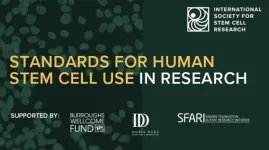(Press-News.org) The addition of ‘trust’ and ‘distrust’ buttons on social media, alongside standard ‘like’ buttons, could help to reduce the spread of misinformation, finds a new experimental study led by UCL researchers.
Incentivising accuracy cut in half the reach of false posts, according to the findings published in eLife.
Co-lead author, Professor Tali Sharot (UCL Psychology & Language Sciences, Max Planck UCL Centre for Computational Psychiatry and Ageing Research, and Massachusetts Institute of Technology) said: “Over the past few years, the spread of misinformation, or ‘fake news’, has skyrocketed, contributing to the polarisation of the political sphere and affecting people’s beliefs on anything from vaccine safety to climate change to tolerance of diversity. Existing ways to combat this, such as flagging inaccurate posts, have had limited impact.
“Part of why misinformation spreads so readily is that users are rewarded with ‘likes’ and ‘shares’ for popular posts, but without much incentive to share only what’s true.
“Here, we have designed a simple way to incentivise trustworthiness, which we found led to a large reduction in the amount of misinformation being shared.”
In another recent paper, published in Cognition, Professor Sharot and colleagues found that people were more likely to share statements on social media that they had previously been exposed to, as people saw repeated information as more likely to be accurate, demonstrating the power of repetition of misinformation.*
For the latest study, they sought to test out a potential solution, using a simulated social media platform used by 951 study participants across six experiments. The platforms involved users sharing news articles, half of which were inaccurate, and other users could react not only with ‘like’ or ‘dislike’ reactions, and repost stories, but in some versions of the experiment users could also react with ‘trust’ or ‘distrust’ reactions.
The researchers found that the incentive structure was popular, as people used the trust/distrust buttons more than like/dislike buttons, and it was also effective, as users started posting more true than false information in order to gain ‘trust’ reactions. Further analysis using computational modelling revealed that after the introduction of trust/distrust reactions, participants were also paying more attention to how reliable a news story appeared to be when deciding whether to repost it.
Additionally, the researchers found that after using the platform, those who had been using the versions with trust/distrust buttons ended up with more accurate beliefs.
Co-lead author, PhD student Laura Globig (UCL Psychology & Language Sciences, Max Planck UCL Centre for Computational Psychiatry and Ageing Research, and Massachusetts Institute of Technology) said: “Buttons indicating the trustworthiness of information could easily be incorporated into existing social media platforms, and our findings suggest they could be worthwhile to reduce the spread of misinformation without reducing user engagement.
“While it’s difficult to predict how this would play out in the real world with a wider range of influences, given the grave risks of online misinformation, this could be a valuable addition to ongoing efforts to combat misinformation.”
* Related research paper in Cognition
END
Social media ‘trust’/’distrust’ buttons could reduce spread of misinformation
2023-06-06
ELSE PRESS RELEASES FROM THIS DATE:
Programmable 3D printed wound dressing could improve treatment for burn, cancer patients
2023-06-06
One of the challenges in treating burn victims is the frequency of dressing changes, which can be extremely painful.
To bring relief to this and other problems, University of Waterloo researchers have created a new type of wound dressing material using advanced polymers. This new dressing could enhance the healing process for burn patients and have potential applications for drug delivery in cancer treatment as well as in the cosmetic industry.
"To treat burn victims, we can customize the shape using a 3D printer, secondly, the material has fine-tuned surface adhesion, which is a key feature", said Dr. Boxin Zhao, a professor in Waterloo's Department of ...
Do chatbot avatars prompt bias in health care?
2023-06-06
Chatbots are increasingly becoming a part of health care around the world, but do they encourage bias? That’s what University of Colorado School of Medicine researchers are asking as they dig into patients’ experiences with the artificial intelligence (AI) programs that simulate conversation.
“Sometimes overlooked is what a chatbot looks like – its avatar,” the researchers write in a new paper published in Annals of Internal Medicine. “Current chatbot ...
Team develops smartphone app to enhance midwifery care in Tanzania
2023-06-06
An international research team from Tanzania and Japan created a smartphone app and conducted a pilot study of how the app might be used to improve midwives’ knowledge and skills in Tanzania. Their study focused on the app’s potential effects on the learning outcomes of midwives and birth preparedness of pregnant women in Tanzania.
The team’s work is published in the journal PLOS ONE on March 31, 2023.
“The smartphone app for midwives showed significant improvements in their learning outcomes, leading to better birth preparations for pregnant women in Tanzania. This study highlights the potential of leveraging technology ...
Webb telescope detects universe’s most distant organic molecules
2023-06-06
An international team of astronomers has detected complex organic molecules in the most distant galaxy to date using NASA’s James Webb Space Telescope.
The discovery of the molecules, which are familiar on Earth in smoke, soot and smog, demonstrates the power of Webb to help understand the complex chemistry that goes hand-in-hand with the birth of new stars even in the earliest periods of the universe’s history. At least for galaxies, the new findings cast doubt on the old adage that where there’s smoke, there’s ...
Breastfeeding for longer may be linked to better exam results in later life
2023-06-06
Children who are breastfed for longer appear to be more likely to gain slightly better results in their school GSCEs at age 16 compared with non-breastfed children, suggests a study published online in the journal Archives of Disease in Childhood.
The evidence of improved educational outcomes is still apparent even when various factors are taken into account such as people’s socio-economic status and their parents’ intelligence.
Previous studies have suggested that children breastfed for longer have improved educational outcomes later in life. However these are relatively scarce, and ...
Close contact intervention between a mother and her premature baby may reduce risk of mortality by almost a third
2023-06-06
A method of care involving skin-to-skin contact between a mother and her prematurely born or low birth weight baby appears to impact the child’s chances of survival significantly, suggests a study published online in the journal BMJ Global Health.
Starting the intervention within 24 hours of birth and carrying it out for at least eight hours a day both appear to make the approach even more effective in reducing mortality and infection, researchers found.
The method of care known as ‘Kangaroo mother care’ (KMC) involves an infant being carried, usually by the mother, in a sling with skin-to-skin contact ...
Defibrillators used in just 10 per cent of out of hospital cardiac arrests - study shows
2023-06-06
Defibrillators are being used in just one in ten cardiac arrests where the lifesaving devices are available, according to new research presented at the British Cardiovascular Society Conference in Manchester.
The research drew upon data from the East of England Ambulance Service and The Circuit, the national defibrillator network developed by the British Heart Foundation (BHF). The Circuit maps the location of defibrillators across the whole of the UK, so that emergency services can direct bystanders to the nearest defibrillator in the event of ...
Virtual blood vessel technology could improve heart disease care
2023-06-06
Patients with heart disease could benefit from less extensive interventions thanks to cutting-edge technology that creates 3D computer models of blood flow through the heart's arteries, according to research presented at the British Cardiovascular Society in Manchester.
When the research team trialled the VIRTUHeartTM technology with doctors treating heart attack patients, they found that using it would have changed the treatment of more than 20 per cent of patients. In many cases, it would have led to fewer patients undergoing an invasive procedure such ...
The ISSCR releases global standards to enhance rigor and reproducibility of stem cell research
2023-06-06
The International Society for Stem Cell Research (ISSCR) today released the ISSCR Standards for Human Stem Cell Use in Research, an international collaboration aimed at enhancing rigor in preclinical research and ultimately strengthening the pipeline of therapies for patients.
“This nearly two-year initiative is groundbreaking for the global stem cell research community,” said Haifan Lin, ISSCR president. “The international standards will make a big difference in the quality of science that is performed and published worldwide.”
The ISSCR is the preeminent international stem cell research society with a reputation ...
Childhood maltreatment predicts adult emotional difficulties
2023-06-06
Have you ever wanted to convey a feeling but just couldn’t find the right words? Millions of people struggle with a personality trait known as alexithymia, which means “no words for feelings.” Individuals with alexithymia have difficulty identifying and describing their emotions. This trait can harm their social and intimate relationships. They are likely to miss social cues and thus fail to recognize or understand the feelings of others. Past research has suggested that a history of child maltreatment could play a role in developing adult alexithymia.
A new meta-analysis published this month in Psychological Bulletin, led by Stanford ...



